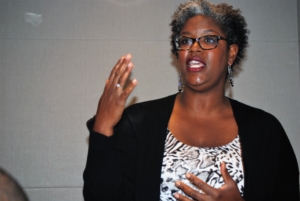
The College of Business at Northern Illinois University enrolled nearly 43% minorities in its 2017 freshman class
Let’s face it. When you’re a first-year undergraduate student and you step foot on campus for the very first time, there’s a lot running through your mind. Leaving family and friends behind, getting adjusted to classes — finding your classes. But for minority students, these anxieties can reach elevated heights when arriving on campus and seeing few faces that resemble their own.
MINORITY RECRUITING AN UPHILL BATTLE FOR BUSINESS SCHOOLS
Over the past two years, the Poets&Quants ranking of undergraduate business programs included a look at the percentage of minorities schools enrolled in their most recent incoming classes. Last year, out of 50 schools that were ranked and the 42 that were able to report enrollment data with regard to minorities, Cornell University’s Dyson School claimed the top spot with 33% of the incoming class made up of U.S. underrepresented minorities (African Americans, Hispanics/Latinos, American Indians or Alaska Natives, Native Hawaiians, and other Pacific Islanders). This year, we nearly doubled the number of institutions that were ranked and the B-school with the highest percentage of incoming minorities was Northern Illinois University’s College of Business with 42.90%. Cornell dropped five spots to number six this year, yet still reported just over 30%.
Other high scorers last year included Babson College, New York University’s Stern School of Business, Texas A&M Mays School, and University of Texas-Austin McCombs School. Each of these schools reported a slight increase in the percentage of minorities in this year’s freshmen class — with McCombs having the highest increase of them all from 19.60% last year to 25.80% this year. But with several newcomers included in the ranking this year, these schools were outdone by some of the others including Rutgers Business School-Newark (41%), Santa Clara University’s Leavey School of Business (40.09%), the University of Miami (FL) School of Business (35%), and Georgia Institute of Technology’s Scheller College of Business (31%).
It’s a known fact that business schools report an uphill battle when it comes to bringing in a diverse mix of students; particularly minority students. Generally, prospective students are frequently unaware of the possibilities that a career in business can afford them and what majoring in business even means. For prospective minority students, this awareness can be even less prominent. While the stats above are just mere numbers reflecting a population of incoming freshmen, the campus experience for minorities is what really matters. Is it an inclusive environment where all backgrounds have an equal footing from the get-go?
‘WHEN YOU SEE TEACHERS WHO LOOK LIKE YOU, IT UNDERSCORES CONFIDENCE THAT YOU BELONG’
Take Nadia Mendes, for example, now a December 2017 graduate of Babson College. When she entered as a freshman, the New York native — who is of Jamaican descent — says she was ecstatic when Babson’s flagship course, Foundations of Management and Entrepreneurship, was co-taught by not one, but two black female professors.
“I was initially blown away,” Mendes recalls of the course taught by Dr. Tina Opie and Dr. Donna Stoddard. “They were maybe the second and third black teachers in my entire life. Number one, it was a shock to have them, but seeing two strong black women not only as professors, but black females who were also proudly displaying their natural hair was life-changing for me.”
While hair may seem like a non-issue to some, for a female student whose black culture celebrates hair — particularly in its natural state and texture — as a symbol of pride and “Black Girl Magic,” the roots run much deeper.
“My hair was always straight from receiving pressure from society and even from some family members that my curls weren’t good enough because of this false narrative we as black women receive in the media,” Mendes continues. “Because of it, I was left feeling uncomfortable wearing my hair natural.”
For black female students in a predominantly white business school, seeing someone with the same texture and style of hair as their own can go a long way to lessen the feeling of being an outsider and, instead, increase a feeling of belonging. Babson’s professor Tina Opie calls this “role modeling” and says it plays a critical role for first year business students when they’re exposed to course material such as economics, stats, and deep entrepreneurship topics for the very first time.
”Most students — no matter what ethnicity — doubt whether they can do it,” says Opie who was one of Poets&Quants‘ Top 40 Undergraduate Business Professors. “When you see teachers in the classroom who look like you and have taken these very courses you’re sitting in and can teach them, it underscores confidence that you can do it too, that you belong, and that it’s appropriate for you to be at a prestigious business school like Babson College.”












Questions about this article? Email us or leave a comment below.